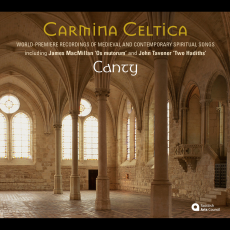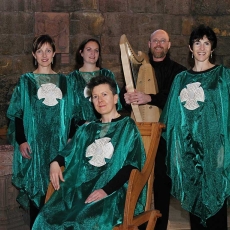Canty - Carmina Celtica - International Record Review
From Scottish Mediaeval music ensemble Canty, which comprises the four regular female singers from Cappella Nova and harpist William Taylor, comes a gorgeous new disc featuring world premieres recordings of mostly contemporary music for voice and harp. Apart from Ivan Moody's O quam mirabilis, all of these works were written for the ensemble.
In her booklet notes, Canty member Rebecca Tavener highlights some of the themes that bind the works together, including ‘the wanderings of Celtic saints across Europe in the Dark Ages, light and the heavenly bodies, and the life-force of creation'. The ancient music featured in the programme also receives its first recording, thus reflecting Canty's conviction that ‘ the music interfaces between classical / traditional, ancient / modern and east / west are permeable ground, rich and ripe for exploration'.
Without exception, the new works plunder the musical procedures of the past, with echoes of plainchant and Mediaeval polyphony underpinning more mellifluous modern harmonies and spicier dissonances, as well as extremes or register. Thus another avenue for continuity and coherence opened up. Moreover, the tone of the programme as a whole is one of gentle luminosity, with occasional flashes of piercing light. Listening thus becomes a meditative as well as an aesthetic experience - which was perhaps the intention. From the flowing opening chant of Salve splendour through the vines and trellises of the Moody, the flexible, overlapping ornaments of Peter McGarr's Flower Garland, the high-flying lines of Michael McGlynn's Lorica, James McCarthy's The Stars in their Courses and Joanne Metcalf's extraordinarily beautiful Shining Light to Rebecca Rowe's subtle, transparent There is nothing brighter than the sun and John Tavener's teeming, exotic Two Hadiths, this is a rich feast, yes, but one that always leaves you wanting more.
The performances, which were recorded in Edinburgh's Greyfriars Church, are exceptional, with Canty's characteristics striving for absolute clarity of diction without sacrificing a sense of line or harmonious, crystalline stillness. Taylor's harp accompaniments, whether improvised or from a score, and whether on the gut strings of the Romanesque or late-Mediaeval bray harp, or the brass and silver strings of the Mediaeval clarsach, are colourful, evocative and utterly expressive of the prevailing text.

